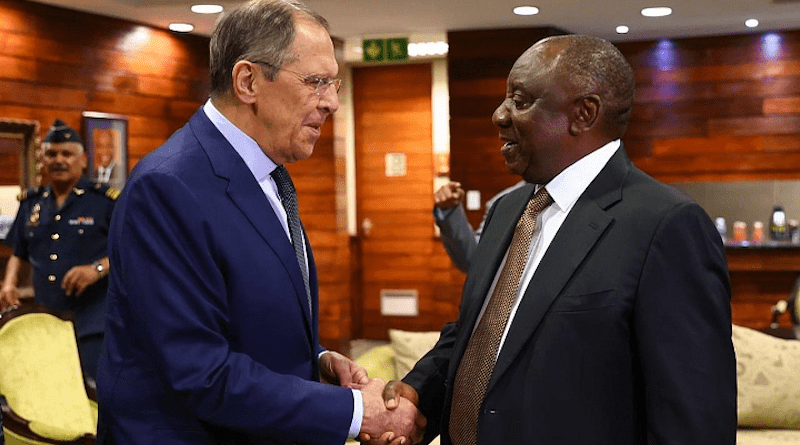US, Russia’s Struggle For Africa Takes Center Stage – Analysis
Africa was a major focus for both the US and Russia last week, with US Treasury Secretary Janet Yellen and Russian Foreign Minister Sergei Lavrov traveling to the continent in a bid to influence key states. The two are fighting over influence in Africa as European states leave the Sahel and China digs deeper into the continent. Africa can be seen within the context of the great power competition framework. For Washington, Africa remains vitally important. Yellen visited Senegal, South Africa and Zambia, while Lavrov visited South Africa, Eswatini, Angola and Eritrea. Lavrov’s visit to the continent was his second in six months.
The US strategy toward Africa is centered on the simple recognition that the continent will shape the future of the global economy. Yellen’s visit was the start of the Biden administration’s efforts to rebuild ties with Africa in the light of China’s rapidly increasing economic presence on the world’s second-largest continent and Russia’s military and diplomatic foothold in parts of it.
Yellen’s time in Zambia focused on Chinese debt traps and mining interests. The US was working on a formula for rejecting such activity, especially as China digs deeper into key African mining states. The US is reaching out to other European and Arab partners to help “offset” Chinese, and Russian, mining practices by reaching new, transparent agreements. For example, the Democratic Republic of the Congo signed such an agreement with the UAE as part of Washington’s Africa policy program.
Yellen visited the South African coal-mining province of Mpumalanga and announced more stringent measures to cap the price of premium Russian oil products on the international market. She also asked South Africa to respond to serious violations of sanctions by local business or by governments. Yellen’s warning was meant to be heard in all African capitals. Her comments were accompanied by Washington declaring Russia’s Wagner Group a foreign terrorist organization that is present in various hot spots throughout the continent. This was a firm warning of US and Western resolve. That Yellen made these comments from South Africa was also highly significant.
South Africa, Africa’s most developed economy and which is pivotal to the US plan, also has deep ties with both Russia and China. It raised concerns at the White House in February 2022, when Pretoria announced it would host Russian and Chinese warships and take part in joint naval drills with them off its east coast, near the sensitive area of the Mozambique Channel.
While Yellen focused on warning South Africa, Lavrov visited Eswatini. Eswatini is one of the few countries in the world that recognizes Taiwan, so Lavrov’s presence in the former Swaziland was significant. Eswatini has signed a deal with Taiwan to put one of Africa’s largest data centers in the country. Lavrov’s visit may interrupt or influence those plans, to the benefit of Chinese tech firms. Eswatini is also near the southern areas of Mozambique, a major focus for many international players.
Lavrov’s visits to Angola and Eritrea ran counter to US interests as presented by Yellen during her Africa trip. Lavrov is searching for continued support for Russia from African states. In the UN General Assembly’s first resolution in March last year condemning Russia’s actions in Ukraine, African countries formed a significant proportion of those abstaining. Eritrea was one of only five countries to vote against the motion, along with Syria, North Korea, China and Belarus.
In both countries, Lavrov visited key Russian cultural monuments as part of Moscow’s soft power outreach. He also held discussions with top Angolan and Eritrean leaders about continuing African support for Moscow in international forums such as the UN. In Angola, Lavrov discussed building nuclear power plants in the country but, given Western restrictions and possible penalties, the likelihood of actual construction is far off, maybe never.
Nevertheless, in both the Angolan and Eritrean capitals, Lavrov talked about Russian port access. The ports discussion is also highly significant for continuing access to Russian maritime assets that have military value. Moreover, Lavrov’s discussion with Eritrea about Russian access to the port of Massawa is certainly going to raise security concerns, given the proximity of the port to Yemen, but also its centrality to Sudanese logistic lines that are undergoing development. This discussion on port access between Russia and key African states is part of an ongoing strategy by Moscow as Western sanctions start to seriously hit.
Meanwhile, Yellen’s visit was a key piece of US foreign policy that needs to be taken seriously by African states. With France leaving the Sahel and the African continent facing a number of very serious threats, from social inequality to terrorism, there is a strong Western requirement to keep what it sees as negative influences away.
Overall, Yellen and Lavrov were focusing more on the southern part of the continent, excluding the key visit of the Russian foreign minister to Eritrea, which is also significant because of the strategic nature of how Africa is geographically divided. The root causes of Africa’s problems need to be addressed in a factual way, as opposed to through narratives that mask reality. Closer attention to atmospherics, instead of relying on probable information warfare outlets, is important. Violations of sanctions policy by African governments and stakeholders will be punished. Whether those Western sanctions will alter the so-called Eastern assertiveness on the African continent as part of the great power competition is another question.

